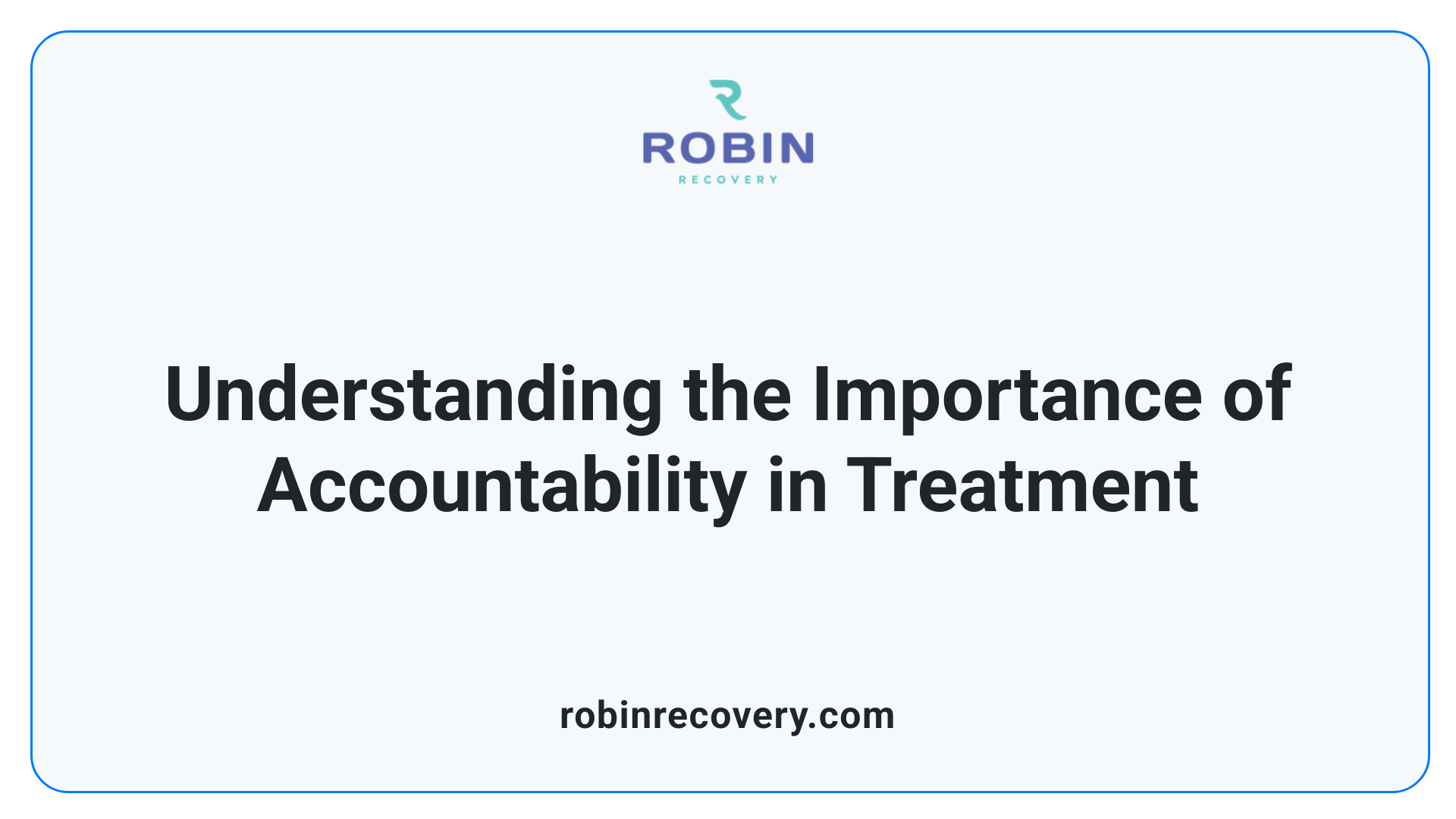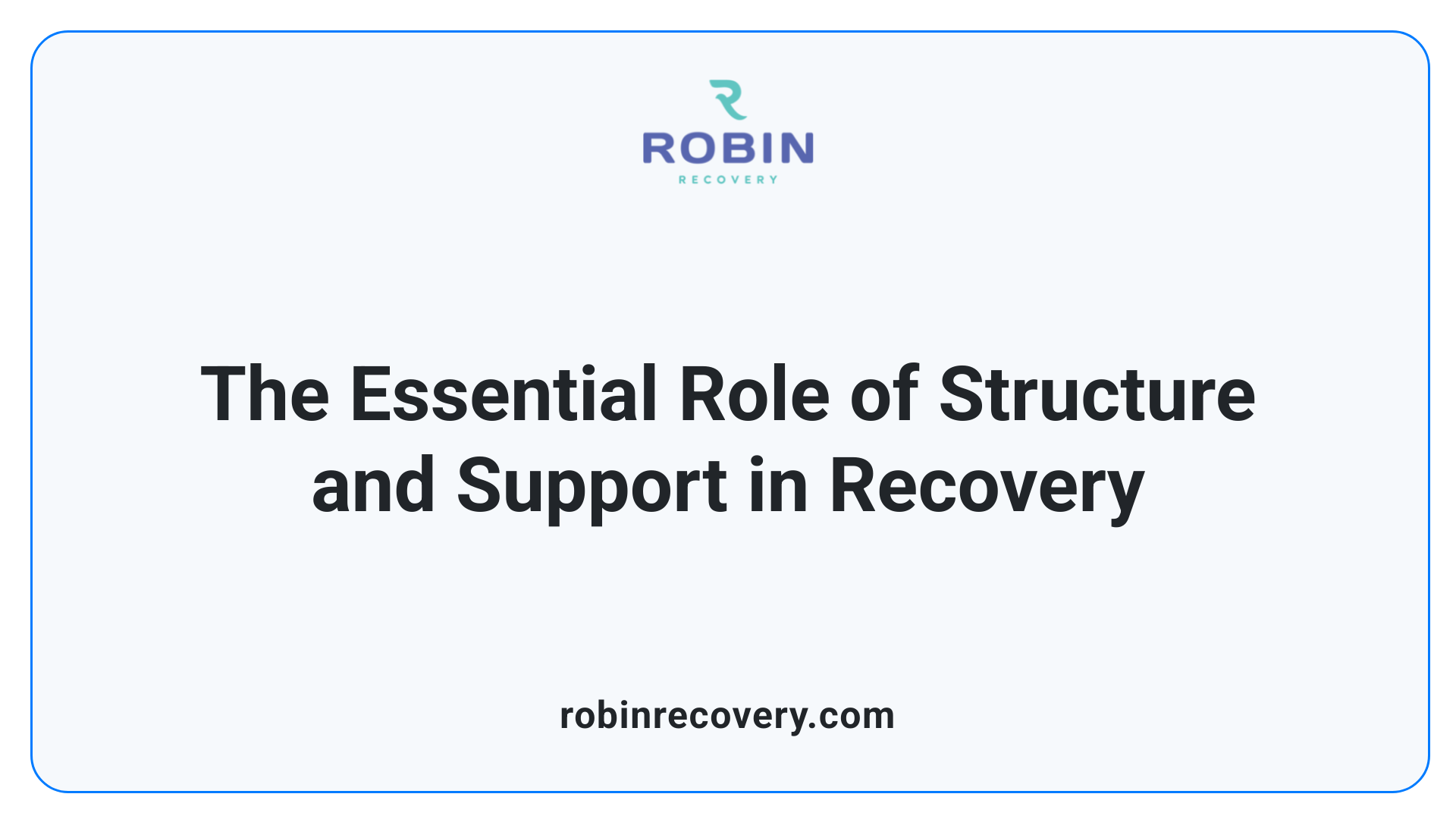The Importance of Accountability in Intensive Outpatient Programs

Exploring Accountability in IOPs
Accountability serves as a cornerstone for success in Intensive Outpatient Programs (IOPs), offering crucial support and structure to individuals navigating addiction recovery. As virtual IOPs gain popularity for their flexibility and accessibility, the role of accountability in these programs becomes increasingly vital. This article delves into the various facets of accountability within IOPs, uncovering how it impacts recovery outcomes, prevents relapse, and fosters personal responsibility.
The Role of Accountability in Treatment

Why is accountability important in treatment?
Accountability is fundamental in treatment settings, especially for those navigating the complexities of addiction recovery. It inspires individuals to take ownership of their actions and decisions, fostering a sense of personal responsibility. This is particularly vital when individuals are confronted with the realities and consequences of their substance use or mental health issues.
When clients engage in accountability, they are encouraged to participate in self-reflection. This process helps them recognize how their behaviors affect their recovery journey and relationships. Constructive feedback from therapists and peers creates a supportive environment, motivating individuals to stay committed to their recovery goals.
Responsibility in recovery
In the context of Intensive Outpatient Programs (IOPs), a structured schedule promotes accountability by requiring patients to adhere to therapy sessions and other treatment activities. This design encourages consistency and discipline, helping clients resist the urge to revert to old habits. Additionally, tailored treatment plans empower patients to set and track measurable goals, reinforcing their commitment and responsibility for their recovery path.
Encouragement from therapists and peers
Support from therapists and peers plays a vital role in reinforcing accountability. Regular check-ins not only monitor progress but also instill a sense of support and encouragement. Peer accountability enhances group dynamics, allowing participants to share their experiences and inspire each other, creating a network of encouragement. Together, these elements help stabilize individuals' recovery journeys, reduce feelings of isolation, and promote lasting change.
Topic Description Example Importance of accountability Fosters personal responsibility and engagement in recovery. Self-reflection sessions Responsibility in recovery Structured schedules encourage adherence and consistency. Scheduled therapy sessions Encouragement from therapists Support and feedback enhance commitment to treatment goals. Regular check-ins
Impact of Accountability in Therapy

How does accountability within therapy facilitate change?
Accountability is a cornerstone in therapeutic settings, particularly in addiction recovery. It cultivates a sense of ownership over one’s actions, fostering deeper self-awareness. By acknowledging patterns of behavior and understanding their consequences, individuals become more open to insights and feedback from their therapists.
This therapeutic accountability is framed by the four R's and three C's:
Four R's Description Recognize Identifying behaviors and their impacts Responsibility Acknowledging ownership of actions Remorse Feeling regret for past actions Repair Making amends in relationships Three C's Description Clarity Clarity in communication and expectations Commitment Dedication to change and growth Consistency Regular follow-through on commitments
The emphasis on these principles encourages patients to construct actionable plans for improvement. This clarity fosters trust and respect within the therapeutic alliance, crucial for effective treatment.
Moreover, accountability not only enhances individual responsibility but also supports psychological well-being. By promoting honest communication and commitment to therapeutic goals, it paves the way for meaningful change that resonates throughout one’s recovery journey.
Navigating Challenges in Accountability

What challenges related to accountability in addiction treatment settings can arise, and how can they be overcome?
Accountability is fundamental in addiction recovery, yet several challenges can hinder its embodiment in treatment settings. One significant obstacle is the history of dishonesty that many individuals face due to their addiction. This can lead to a reluctance to accept responsibility, which is critical for engaging fully in the recovery process.
To counter these hurdles, fostering a supportive environment is paramount. Encouraging open communication creates trust and allows individuals to express fears and challenges without judgment. This atmosphere boosts self-esteem, essential for recognizing personal responsibility in their recovery journey.
Building a robust support network plays a vital role as well. When individuals surround themselves with peers, family, and therapists who actively encourage accountability, they are more likely to take ownership of their treatment. Regular check-ins or accountability sessions with therapists can serve as constructive feedback loops, enabling them to reflect on their progress, identify weaknesses, and adjust their approach.
Encouraging honesty not only strengthens relationships but also helps individuals reaffirm their commitment to recovery. Honesty leads to a deeper self-awareness, aiding the acknowledgment of triggers and avoidance patterns, which is crucial in preventing relapse. By addressing these challenges proactively, individuals can turn accountability into a powerful ally on their path to sustained sobriety.
Structured Environments and Support Systems

How does structured environments and support systems benefit accountability in recovery?
Structured environments and support systems play a vital role in enhancing accountability during recovery from substance use disorders. These structures help individuals engage consistently with their treatment, thereby promoting personal responsibility.
Benefits of Structured Environments
- Routine and Stability: Structured settings such as Intensive Outpatient Programs (IOPs) provide a clear schedule, often including three to five hours of therapy per day. This consistency creates a framework for recovery, which fosters self-discipline and encourages participation.
- Progress Tracking: Regular therapy sessions and check-ins with case managers allow individuals to monitor their progress and reflect on their journey. Digital tools also enable patients to set and track measurable goals, enhancing their focus.
Role of Support Systems
- Peer Support: Group therapy not only offers professional guidance but also harnesses the power of peer accountability, where members motivate each other by sharing experiences. This fosters a collective responsibility for success.
- Family Involvement: Including family members in therapy sessions adds another layer of accountability. Family can provide emotional support, feedback, and encouragement, all of which bolster the commitment to recovery.
Enhancing Personal Responsibility
Open communication and honesty are cornerstones of recovery accountability. Individuals must acknowledge their choices and their consequences, thereby taking ownership of their path. Having a support network—comprising therapists, peers, and family—ensures individuals are not navigating this journey alone.
Peer and Family Involvement in Accountability

Peer Support Systems
Peer support systems play a significant role in promoting accountability within virtual Intensive Outpatient Programs (IOPs). Participants encourage each other by sharing their personal experiences and providing motivation. This environment fosters a sense of shared responsibility, as individuals realize they are not alone in their struggles.
Family Therapy Sessions
Incorporating family members into treatment, especially through family therapy sessions, adds an essential layer of accountability. Families have the opportunity to understand the recovery process and provide emotional support. This involvement encourages patients to commit to their treatment goals and strengthens the overall support network.
Shared Responsibility for Success
The shared responsibility model is vital for recovery in virtual IOPs. When both peers and family participate in holding individuals accountable, it creates a supportive atmosphere. This interconnectedness not only enhances motivation but also reinforces the importance of commitment to recovery, leading to better outcomes.
Harnessing Technology for Enhanced Accountability
Digital tools in IOPs
Modern Intensive Outpatient Programs (IOPs) leverage various digital tools to bolster accountability among participants. These platforms, often accessible via smartphones or computers, allow individuals to engage with the program more flexibly while still adhering to structured schedules.
Progress tracking
Participants can track their recovery progress through dedicated apps that encourage them to set measurable goals. This self-monitoring enables individuals to reflect on their growth and remain focused on their treatment path.
Real-time feedback
Real-time feedback provides an essential layer of support within virtual IOPs. With instant updates on mood or behavior, therapists can quickly intervene when necessary, helping to reinforce commitment to recovery goals.
Aspect Description Importance Digital Tools Apps and platforms for engagement and monitoring Enhance flexibility in treatment Progress Tracking Setting measurable goals and tracking recovery Improves motivation and focus Real-time Feedback Immediate insights and therapist intervention Reinforces accountability and treatment adherence
By integrating these technological solutions, virtual IOPs foster a culture of accountability that enhances long-term recovery outcomes.
Personal Responsibility and Growth in IOPs
Ownership of Recovery Journey
In virtual Intensive Outpatient Programs (IOPs), participants are encouraged to take ownership of their recovery. This means acknowledging their decisions and understanding that they are responsible for both their addiction and the journey toward sobriety. Embracing this personal responsibility fosters a mindset aimed at healing and personal growth.
Goal Setting and Monitoring Progress
Central to maintaining accountability in virtual IOPs is the practice of setting measurable goals. Patients regularly track their progress using digital tools, which helps maintain focus and motivation. This systematic approach reinforces the notion that recovery is not a passive process but an active journey involving concrete steps and milestones.
Empowering Individuals with Accountability
Accountability in IOPs is about more than just responsibility; it is about empowering individuals to make meaningful changes. Through structured schedules and regular check-ins with therapists, participants develop strategies to manage their recovery actively. This process instills confidence and promotes a sense of self-efficacy, which are vital for overcoming addiction.
The Path Forward with Accountability
Accountability within Intensive Outpatient Programs plays an indispensable role in fostering lasting recovery from substance abuse and mental health disorders. By embracing personal responsibility and utilizing structured frameworks, digital tools, and strong support systems, individuals engaged in IOPs are better equipped to maintain sobriety and rebuild their lives. As addiction recovery continues to evolve, the significance of accountability in enhancing personal growth, preventing relapse, and achieving overall success remains clear. These programs empower participants to take control of their recovery journey and cultivate healthier, more fulfilling lives.
References
- What Role Does Accountability Play in a Virtual Intensive Outpatient ...
- How IOP Can Provide Support and Accountability
- How do virtual intensive outpatient programs promote accountability ...
- Understanding the Importance of Accountability | Rehab - Alina Lodge
- The Role of Honesty and Accountability In Addiction Recovery
- Accountability in Recovery: What You Should Know - Golden Gate
- The Importance of Accountability in Recovery | Waypoint
- Accountability in Recovery: Why Support Is Important - Immersive
